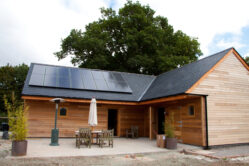We’ve covered VA loans extensively here at The Military Wallet.
They offer eligible veterans and active military personnel incredible benefits in purchasing or refinancing a home.
But are there times when a VA loan may not be the best option? There are, so it’s time to take a close look at VA loan alternatives.
Best VA Loan Alternatives For Buying A House
There are basically three alternatives:
Though you’ll definitely want to go with a VA loan in 9 out of 10 home financing cases, one of these loans may be a better alternative in that tenth case.
Let’s take a high altitude look at all three alternatives, as well as discuss when they may be a better choice than a VA loan.
1. FHA Mortgages
FHA mortgages are available to all borrowers, including veterans and active-duty military personnel.
Maximum loan amounts are identical to limits for VA loans and conventional mortgages, including higher loan amounts in areas designated as high cost.
Much like VA loans, FHA mortgages are for owner-occupied properties only. They are not available for either second homes or investment properties.
However, they can be used to purchase two to four family properties, where you will live in one unit, and rent out the others for income.
Qualifying for an FHA Loan
Down payment requirement. The standard down payment requirement on FHA mortgages is 3.5% of the purchase price.
Credit. The minimum credit score using a 3.5% down payment is 580. However, each individual lender is able to impose their own minimum. Many set that minimum at 620.
But FHA guidelines do permit a credit score as low as 500. However, you must make a down payment of at least 10% to qualify with a score that low.
If you have a previous bankruptcy, FHA requires that at least two years must pass since the discharge of a Chapter 7 (total) bankruptcy, and at least 12 months with a Chapter 13.
Since Chapter 13 is a repayment plan, you must show at least 12 months of on-time payments to be eligible for FHA financing. Foreclosure generally requires three years, but a shorter-term may be approved with extenuating circumstances, providing it was on a primary residence.
Debt-to-income (DTI) ratios. The maximum DTI is generally 43%. That takes in your proposed house payment, including mortgage payment, property taxes, homeowner’s insurance, and mortgage insurance – plus your recurring monthly debts, divided by your stable monthly income.
However, a DTI as high as 50% may be approved with compensating factors. Those can include a larger than the minimum down payment, excellent credit, a very small increase in your new monthly house payment compared with the current one (as long as those payments are being made on-time), or cash reserves after closing.
Mortgage insurance premium. FHA mortgage insurance is paid in two parts. You’ll generally pay 1.75% of the loan amount upfront, which is referred to as “up-front mortgage insurance premium” (UFMIP).
Much as is the case with the VA funding fee, the UFMIP is added to your loan amount, and financed over the term of the loan. There is also a monthly mortgage insurance premium.
For most borrowers making a 3.5% down payment, the monthly mortgage insurance premium rate will be 0.85%.
If the loan amount is $200,000, that translates to $1,700 per year, or roughly $142 per month. It will cancel out when your loan amount is paid down to 78% of the value of the property.
When To Choose an FHA Loan Over a VA loan
An FHA mortgage may be a preferred loan type if you decide you don’t want to use your VA entitlement for the purchase of a particular property.
That may happen if you’re purchasing a starter home that you intend to be a temporary arrangement, after which you may rent it out and use as an investment property.
You can then save your VA entitlement for the purchase of a permanent owner-occupied home. An FHA mortgage may also be preferred if you’re unable to qualify for a VA loan based on your credit profile.
While VA loans tend to be more flexible than conventional mortgages with credit, FHA is generally the most accommodating of all.
2. USDA Mortgages
The main feature of USDA loans compared to VA loans is 100% financing. Just as is the case with a VA mortgage, you can purchase a property using a USDA mortgage with zero down payment.
Otherwise, the two are very different loan programs. USDA loans are available to the general public, while VA loans are restricted to eligible veterans and active duty military personnel.
But in order to qualify for USDA mortgage, you must meet eligibility as a low or moderate-income household. This will vary by your county of residence and can be determined by checking the USDA’s income eligibility calculator.
In addition, unlike VA loans, USDA mortgage limits vary by the county where the property is located. USDA loans are restricted to single-family properties only.
USDA mortgages are not available in all counties across the US, but about 97% of counties are eligible.
Eligible properties must meet the following requirements:
- Generally be 2,000 square feet or less.
- Not have a market value in excess of the applicable area loan limit (as described above).
- Have no in-ground swimming pools.
- Not be designed for income producing activities.
USDA mortgages have fixed interest rates, but can be modified by payment assistance, making them as low as 1%. Loan terms can range from 33 to as many as 38 years for very low-income applicants.
They also allow borrowers to add closing costs to the base loan amount, equal to up to 6% of the purchase price of the property.
Qualifying for a USDA Loan
To be eligible for a USDA loan, you must meet the following qualifications:
- You must qualify as a low- or moderate-income household based on income limits in your county of residence.
- The subject property must be occupied as a primary residence.
- Subject property must be located in an eligible county.
- The borrower must be a US citizen, a non-citizen national, or a qualified alien.
Credit. The minimum credit score is 640, though you may be able to go as low as 620 with compensating factors. If you have a bankruptcy or foreclosure, you must wait at least 36 months to apply.
Debt-to-income (DTI) ratios. As described above, you must qualify as either low- or moderate-income in your county of residence. USDA uses two DTI ratios to determine income eligibility.
First, your basic house payment – mortgage payment, property taxes, homeowner’s insurance, and mortgage insurance – shouldn’t exceed 29% of your stable monthly income.
Second, your basic house payment, plus other recurring debt payments, shouldn’t exceed 41% of your stable monthly income. However, with strong compensating factors, these ratios may be exceeded.
Mortgage insurance premium. VA loans cover this with a VA funding fee ranging from 2.15% to 3.30% of the base loan amount. USDA mortgages have an upfront fee of 1%, which is added to the base loan amount.
But they also add an annual premium equal to 0.30% of your loan amount. On a $200,000 mortgage, that will be $600 per year, or $50 per month.
When To Choose a USDA Mortgage Over a VA loan
A USDA mortgage will be worth considering if you qualify as low- to moderate-income, and can’t qualify for VA loan, based either on income or credit.

Check your VA Home Loan eligibility and get personalized rates. Answer a few questions and we'll connect you with a trusted VA lender to answer any questions you have about the VA loan program.
3. Conventional Mortgages
Conventional mortgages have loan limits identical to those for VA loans. But they tend to be less accommodating than VA loans when it comes to credit.
However, countering that limitation is the fact that conventional mortgages are available for the purchase of second homes and investment properties, while VA loans are not.
Much like VA loans, conventional mortgages can be used to purchase single-family homes, and two to four family properties, in which you will live in one unit, and rent out the others. Conventional financing may be used on properties throughout the US.
Qualifying for a Conventional Mortgage
Down payment requirement. This is probably the biggest difference between VA loans and conventional mortgages. While VA loans offer 100% financing, conventional mortgages typically require a minimum down payment of 5%.
Though there are programs available for first-time home buyers and lower income households that will permit down payments as low as 3%.
Larger down payments will be required for second homes and investment properties.
Credit. Conventional mortgages require a minimum credit score of 620. However, they tend to be less forgiving than VA loans, because credit score will be a major factor determining the interest rate you will pay on the loan.
For that reason, rates on conventional mortgages tend to favor those with higher credit scores. If you have a bankruptcy, foreclosure, or short sale, you must wait a minimum of two years before applying for a conventional mortgage.
Debt-to-income (DTI) ratios. Conventional mortgages go by “28/36” – your proposed house payment, including the mortgage payment, taxes, and insurance – shouldn’t exceed 28% of your stable monthly income. The proposed house payment, plus monthly recurring debt, shouldn’t exceed 36%.
That said, DTI ratios on conventional mortgages are routinely exceeded. This is particularly true if you’re making a large down payment (20% or more), have excellent credit, or a large amount of financial assets available after closing.
Higher debt ratios may also be approved if your house payment is either remaining the same as your current one, or exceeding it only slightly.
Mortgage Insurance Premium
Conventional mortgages require mortgage insurance only when you’re making a down payment of less than 20% of the property you’re buying.
Unlike VA loans, and FHA in USDA mortgages, mortgage insurance on conventional mortgages isn’t standard.
It’ll be determined by several factors including:
- The amount of your down payment (3%, 5%, 10%, 15%)
- Your credit score
- The term of your loan
- The type of loan (fixed vs. adjustable rate)
- Property use (owner-occupied or second home)
For those reasons, it’s impossible to generalize what the mortgage insurance premium will be. However, conventional mortgages come only with monthly mortgage insurance premiums.
There is no upfront mortgage insurance premium, either added to your loan amount or required to be paid up front.
When To Choose a Conventional Home Loan Over a VA loan
A conventional mortgage will be a better choice for an eligible veteran or active military person if he or she prefers not to use their VA entitlement for the purchase of a particular property.
That can be a situation in which you’re purchasing a home which will eventually be converted to an investment property.
You may want to save your VA entitlement for the purchase of your next house, which will be more permanent.
Conventional mortgages will also be necessary if you’re purchasing either an investment property or a second home. Since VA (and for that matter, FHA) mortgages don’t cover those property types, conventional mortgages will be the only choice.
Which Is Right For You?
It’s worth repeating – in most cases, eligible veterans and active-duty military personnel will be better served by taking a VA loan.
But if any of the above-listed exceptions apply to you, you should look into one of the VA loan alternatives.
Be sure to carefully decide which of the three will be in your best interests.

Equal Housing Opportunity. The Department of Veterans Affairs affirmatively administers the VA Home Loan Program by assuring that all Veterans are given an equal opportunity to buy homes with VA assistance. Federal law requires all VA Home Loan Program participants – builders, brokers and lenders offering housing for sale with VA financing – must comply with Fair Housing Laws and may not discriminate based on the race, color, religion, sex, handicap, familial status, or national origin of the Veteran.



Comments:
About the comments on this site:
These responses are not provided or commissioned by the bank advertiser. Responses have not been reviewed, approved or otherwise endorsed by the bank advertiser. It is not the bank advertiser’s responsibility to ensure all posts and/or questions are answered.
Thomas Dotson Jr says
need help!
mother passed without a will or a trust. I’m a veteran with 100 percent disability. Going to probate court. I have been advised that I would be the administrator, the home is in a reverse mortgage. Just trying to see what assistance I could get from the VA in recieving a small loan for minor repairs to make the home presentable to sell on the market.
Ryan Guina says
Thomas, I’m not sure if you can get a loan from the VA to rehab a house that is in probate. You can contact them for more information about your options, but I don’t know if it will get you anywhere. I recommend speaking with a local real estate agent to help you better understand your options. Best wishes!